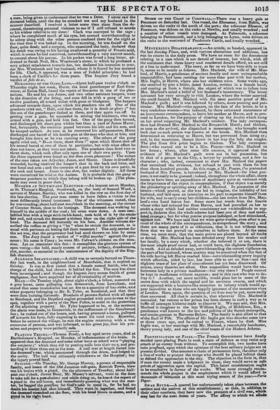MYSTERIOUS DissrnEstissicE.—An article, so headed, appeared in the last Sunday
Times, and, with various alterations and additions, has run its course in the daily press. We have no room for the documents relating to a case which is not devoid of interest, but which, with all the assistance that tIsese heavy and cumbered details afford, we are still at a loss to understand. The story, as far. as we have been able to trace it, seems to be nearly as follows, Mrs. Macleod, the wife of Mr. Mao. heed, of Harris, a gentleman. of ancient family and most unimpeachable respectability, had keen residing for some time past with her mother, Mrs. Inglis, at Havre, where also her children were. Some weeks ago, she received by pest a.letter' dated London, written in a female hand, and coming as from a female, the object of- which was to infuse into Mrs. Macleod's mind a belief of her husband's inconstancy. The letter intreated her very strongly to visit London, where the writer asserted she could furnish Mrs. Macleod with the Most positive proof of Mr. Macleod's guilt ; and it was followed by others, more pressing and par- ticular. Mrs. Macleod—who appears, on the face of .the letter, to be a very credulous woman—was induced, by these reiterated statements of an anonymous correspondent, to leave her mother at Havre, and to pro- ceed to London, for the purpose of clearing up the doubts which hung on her mind respecting Mr. Macleod's conduct. The lady correspon. dent had directed Mrs. Macleod to the Brunswick lintel ; and thither, as soon as she arrived, she dispatched a messenger, who brought word back that no such person was known at the house. Mrs. Macleod then determined on returning to Havre, but was prevented from doing so ; and, in the. meantime, chance threw in her way the lady. she sought. The plot from this point begins to thicken. The lady correspon.s dent—who turned out to be a Mrs. Pearse—took Mrs. Macleod to her house ; where, after some idle excuses, it appeared that the evidence of Mr. Macleod's guilt were not in her Possession, but in that of a person in the City, a lawyer by profession, and a Jew in character ; who, indeed, consented to show Mrs. Macleod the papers that contained the evidence, but refused to part with them for less than three hundred pounds. At this stage, a Mr. Pearse, the pretended husband of Mrs. Pearse, is introduced to Mrs. Macleod—for what pur- pose, is not easily to be guessed : indeed, throughout the whole affair, there seems to have been an expenditure of machinery quite at variance with the importance of the object in contemplation if that object was merely the plundering or spiriting away of Mrs. Macleod. In possession of the letters—which proved, as she was led to imagine, the infidelity of her husband, and laid open an intention on his part to separate himself from his wife, and to carry away her children—the last notice from Mrs. Mac. leod's own sand leaves her. Some more last words from the female whose wiles had seduced her from Havre, and had prevailed on her to credit a story which had neither consistency nor verisimilitude to sup- port% declares that the whole scheme had been one of deep and medi.. La* revenge ; but for what precise purpo.se indulged, or how stimulated, appears not. We have said that we, were quitennable,even afteva rusal of the whole of the correspondence, totomprehend the story ; and there are many. parts of it so ridiculous, that it is not without dome, force that we can prevail on ourselves to believe them. At the same time, we. must state, that the main points are placed beyond all doubt or denial. Mrs. Macleod has been deluded away, from her mother and her family, by a story which, whether she believed it or not, there is the most ainple proof never had, or could have, the slightest foundation in truth. And so deluded away, notwithstanding the utmost vigilance on, the part of her husband, whose anxiety may be conceived when the fact of his wife having left Havre reached him—notwithstanding every inquiry which affection, aided by law, has been able to set on foot—not the slightest trace of her place of concealment has yet been discovered. Of course, many theories are afloat. One supposition would have the un. fortunate lady in a private madhouse—but why there ? People cannot be kept in madhouses without expense; and in this case who was to de- fray it ? Another, yet more terrible, would place her in some of the secret dens with which the capital and its environs swarm and which are supported with a business-like attention to infamy which would ap- pear incredible to those who are happily ignorant of the monstrous vices of London. Here, again, the question of cui bon° maybe put, more easily than answered. All that is certain is, that wherever Mrs. Macleod is concealed, her retreat or her prison has been chosen in such a way as to baffle all attempts hitherto made to discover it. We may add, that Mrs. Macleod is daughter to the late William Inglis, of Middleton, Esq., a gentleman well known to the law and politics of the Scotch metropolis, and cousin-german to Baroness Bulow. The family is also allied to that of the Earl of Fife. The affairs of Mr. Inglis got into disorder some two or three years ago, and he retired to France, where he died. Miss Inglis was, at her marriage with Mr. Macleod, a remarkably handsome, showy young lady, and one of the chief toasts of the Modern Athens.


























 Previous page
Previous page